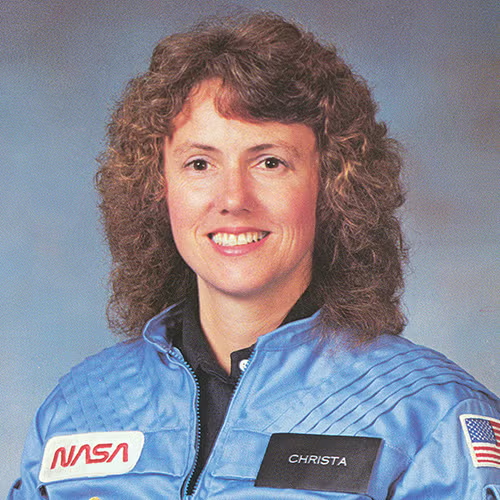
Table of Contents
Who Was Christa McAuliffe?
Christa McAuliffe was a distinguished high school teacher who made history as the first American civilian selected to travel into space. In 1985, she was chosen as part of NASA’s Teacher in Space program. On January 28, 1986, McAuliffe boarded the Space Shuttle Challenger at Cape Canaveral, Florida. Tragically, shortly after lift-off, the shuttle exploded, resulting in the deaths of all seven crew members aboard, including McAuliffe.
Early Life
Born Sharon Christa Corrigan on September 2, 1948, in Boston, Massachusetts, she was the eldest of five children of Edward and Grace Corrigan. At the age of five, McAuliffe’s family relocated to Framingham, Massachusetts, where she grew up in a quiet, suburban neighborhood during the height of the Space Age.
McAuliffe graduated from Marian High School in 1966 and went on to study American history and education at Framingham State College. She graduated in 1970 with a bachelor’s degree and married Steven McAuliffe, whom she had met in high school. The couple went on to have two children: a son, Scott, born in 1976, and a daughter, Caroline, born later in 1981.
Her career as an educator began in Maryland, where she taught American history and English to junior high school students. In 1978, after earning a master’s degree in education from Bowie State College, McAuliffe and her family moved to Concord, New Hampshire, where she taught high school.
In 1981, when the first space shuttle orbited Earth, McAuliffe made sure her students took careful notes of the event. Five years later, her dedication to education and her passion for space exploration led her to apply for NASA’s Teacher in Space Project, a groundbreaking initiative announced by President Ronald Reagan and NASA in 1984.
Selected for Space Mission
Christa McAuliffe was an exceptional educator with a lifelong dream of traveling to space. When NASA announced a competition to select a teacher for a space mission, she eagerly applied. McAuliffe triumphed over more than 11,000 applicants and was chosen to be the first private citizen to participate in a space flight. The announcement came during a special ceremony at the White House, where Vice President George H.W. Bush shared the news, highlighting McAuliffe’s historic achievement.
Upon receiving the selection, McAuliffe was celebrated by her community, which hailed her as a hometown hero. To her, the mission represented the ultimate field trip, one that would allow her to bring space exploration into the classroom. McAuliffe believed her participation in the space program would provide students with a unique opportunity to learn about space and NASA’s operations firsthand.
The extensive training required for the mission was a significant challenge, particularly in terms of being away from her family. In September 1985, McAuliffe traveled to the Johnson Space Center in Houston, Texas, where she would remain until the holidays. The year 1986 was dubbed “the year of the space shuttle,” with 15 missions planned, including McAuliffe’s own, STS-51L, which was set to be the first launch of the year.
The launch of the shuttle was initially scheduled for January 22, 1986, but it faced several delays. The first delay was routine, followed by a dust storm at an emergency landing site. Inclement weather at the launch site caused another postponement, and the final delay was due to a technical issue with a door latch mechanism.
Challenger Tragedy
On January 28, 1986, McAuliffe’s friends, family, and students eagerly watched as the Challenger space shuttle prepared for launch from the Kennedy Space Center in Cape Canaveral, Florida. Millions across the country, including her students in Concord, New Hampshire, tuned in to witness the historic event. However, just 73 seconds after lift-off, the shuttle tragically exploded, claiming the lives of all seven crew members aboard.
The nation was in shock, and President Ronald Reagan delivered a poignant tribute to the crew, referring to them as heroes who exemplified the courage and sacrifice that had built America. “This America, which Abraham Lincoln called the last, best hope of man on Earth, was built on heroism and noble sacrifice,” Reagan said. “It was built by men and women like our seven-star voyagers, who answered a call beyond duty.”
Following the disaster, NASA conducted an extensive investigation, revealing that the primary cause of the explosion was a failure in the right solid rocket booster. A gasket malfunction, compounded by the cold weather affecting the O-rings, caused a fuel leak that ignited, leading to the explosion.
Lasting Legacy
Christa McAuliffe’s bravery and dedication to education were honored posthumously with the Congressional Space Medal of Honor. Her memory continues to inspire, with a planetarium in Concord named in her honor, as well as an asteroid and a crater on the moon. Additionally, the Christa Corrigan McAuliffe Center at Framingham State College was established to further her legacy, advancing educational practices and supporting the next generation of teachers and students.
